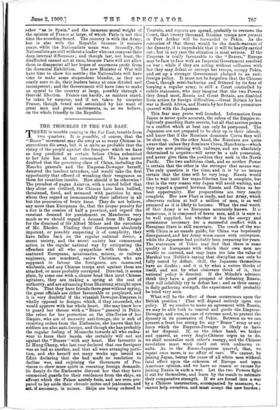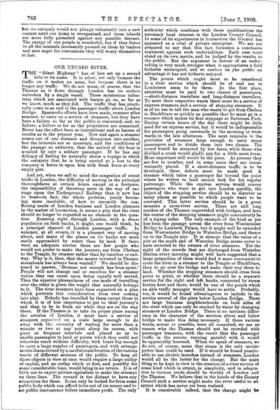THE TROUBLES IN THE FAR EAST. T HERE is trouble coming
in the Far East, trouble from two quarters. It is possible, of course, that the " Boxer " movement may die away as so many Chinese in- surrections die away, but it is quite as probable that the rising of the people against the foreigner which we have so long predicted as certain before China submitted to her fate has at last commenced. We have never doubted that the governing class of China, including the Manchu generals and the Empress-Dowager herself, detested the insolent intruders, and would take the first opportunity that offered of wreaking their vengeance on them for countless insults. How should it be otherwise ? The proudest of pagan Asiatics, with a rooted belief that they alone are civilised, the Chinese have been bullied, threatened, fined, and menaced with partition by men whom they regard as immeasurably their inferiors in all but the possession of brute force. They do not believe, any more than Europeans do, that the proper penalty for a riot is the cession of half a province, and regard the constant demand for punishment on Mandarins very much as we should regard a demand from Mr. Kruger for the dismissal of Sir Alfred Milner and the execution of Mr. Rhodes. Finding their Government absolutely impotent, or possibly suspecting it of complicity, they have fallen back on the regular national device a secret society, and the secret society has commenced action in the regular national way by extirpating the offenders and all who sympathise with them. All scattered Europeans, missionaries, miners, or railway engineers, are murdered, native Christians, who are supposed to favour the foreigners, are massacred wholesale, and any Chinese troops sent against them are attacked, or more probably corrupted. Directed, it seems plain, by some one with a clearer head than most Chinese agitators, they are making a spring at the seat of authority, and are advancing from Shantung straight upon Pekin. That they have friends there goes without saying, the great officials are either favourable or perplexed, and it is very doubtful if the vixenish Dowager-Empress is wholly opposed to designs which, if they succeeded, she would approve with her whole heart. She may know how to guard her throne with a "Boxer" general in Pekin. She relies for her protection on the ulta-Tories of her Empire, who are of necessity anti-foreign, she is sick of receiving orders from the Embassies, she knows that her soldiers are also anti-foreign, and though she has probably the regular feeling of Monarchs towards all who endea- vour to force their hands, she certainly will not act against the " Boxers " with any heart. Her favourite is Li Hung Chang, who last year declared that one foreigner was as bad as another, and that all were arranging parti- tion, and she herself not many weeks ago issued an Edict declaring that she had made no resolution to decline war, and enjoining the Governors of Pro- vinces to show more spirit in resenting foreign demands. So deeply do the Embassies distrust her that they have summoned guards for their residences from the ships, an affront which the Palace mutely feels, and are even pre- pared to lay aside their chronic spites and jealousies, and ad, if necessary, in unison. Ships are being ordered to Tientsin, and reports are spread, probably to overawe the Court, that twenty thousand Russian troops now present in Port Arthur will be forwarded to Pekin. As the execution of that threat would be the death-warrant of the dynasty, it is improbable that it will be hastily carried out ; but in any case the situation is most serious. If the Empress is really favourable to the "Boxers," Europe may be face to face with an Imperial Government resolved on war ; while if they are acting without collusion with her they may defeat or corrupt her troops, occupy Pekin, and set up a stronger Government pledged to an anti- foreign policy. It must not be forgotten that the Chinese Court, though semi-barbarian and fettered by its fear of keeping a regular army, is still a Court controlled by subtle statesmen, who may imagine that the two Powers they dread most, Russia and Great Britain, are disabled from action by foreign difficulties,—Great Britain by her war in South Africa, and Russia by her fear of a premature quarrel with the Japanese.
This fear may prove well founded. Information from Japan is never quite accurate, the rulers of the Empire re- ligiously guarding State secrets, but all that arrives points to a conflict which at best can only be postponed. The Japanese are not prepared to be shut up in their islands, and know that if the Russians dominate Cores. they will be shut up. On the other hand, the Russians are quite aware that unless they dominate Cores., Manchuria—which they are now piercing with railways and are absolutely determined to acquire—will never be a safe possession, and never give them the position they seek in the North Pacific. The two ambitions clash, and as neither Power is certain that the other is the stronger that means war. The only question is the time, and it is by no means certain that the time will be very long. Russia would like to wait until her trans-Siberian line is complete, but that is the very reason why Japan will avoid waiting, and may regard a quarrel between Russia and China as her best opportunity. Her preparations are very nearly complete. Her new Fleet is ready, and her Army, which observers reckon at half a million of men, is as well prepared as it is likely to become. What the real worth of that Army is no European accurately knows. It is numerous, it is composed of brave men, and it is sure to be well supplied, but whether it has the energy and persistence necessary for a successful conflict with a European State is still uncertain. The result of the war with China is an unsafe guide, for China was hopelessly disorganised, and her Army worm-eaten with corruption, while the Japanese had probably been preparing for years. The statesmen of Tokio may find that there is some quality in Europeans with which their own men are unable to contend, and may learn too late the value of Marshal von Moltke's saying that discipline can only be fully tested by defeat. Still, the Japanese themselves have no doubts ; and it is by what a, nation thinks of itself, and not by what observers think of it, that national policy is directed. If the Mikado's advisers think they have a good prospect of defeating Russia, they will infallibly try to defeat her ; and as their enemy is daily gathering strength, the experiment will probably be tried very soon.
What will be the effect of these occurrences upon the British position ? That will depend entirely upon our policy. If we resolve to make an agreement with Russia, we may be able both to control and guide the Empress- Dowager, and even, in case of extreme need, to protect the dynasty in its possession of Pekin. Between us we can present a front too strong for any "Boxer" army or any force which the Empress-Dowager is likely to have at her disposal. If, on the other hand, we bicker and quarrel, as every Anglo-Chinese urges us to do, we shall neutralise each other's energy, and the Chinese revolution must work itself out with unknown re- sults. As to the Russo-Japanese quarrel, that, we repeat once more, is no affair of ours. We cannot, by joining Japan, betray the cause of all white men without fatal effect upon the cohesion of Europe and upon American opinion, and we have no reason or excuse for joining Russia in snob a war. Let the two Powers fight it out for themselves, and learn by the result to estimate their comparative strength. If we are forced into a war by a Chinese insurrection, accompanied by massacre, cannot help ourselves, and must accept the new burden; but we certainly would not plunge voluntarily into a new contest until our Army is reorganised, and these islands are more fully protected against any possible descent. The energy of our people is wonderful, but if they listen to all the counsels incessantly pressed on them by traders and men eager for concessions they will weary themselves at last.



































 Previous page
Previous page